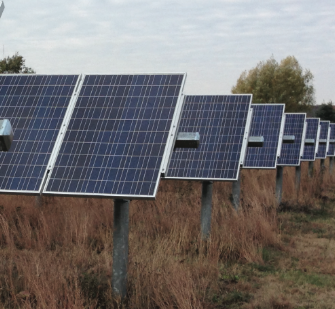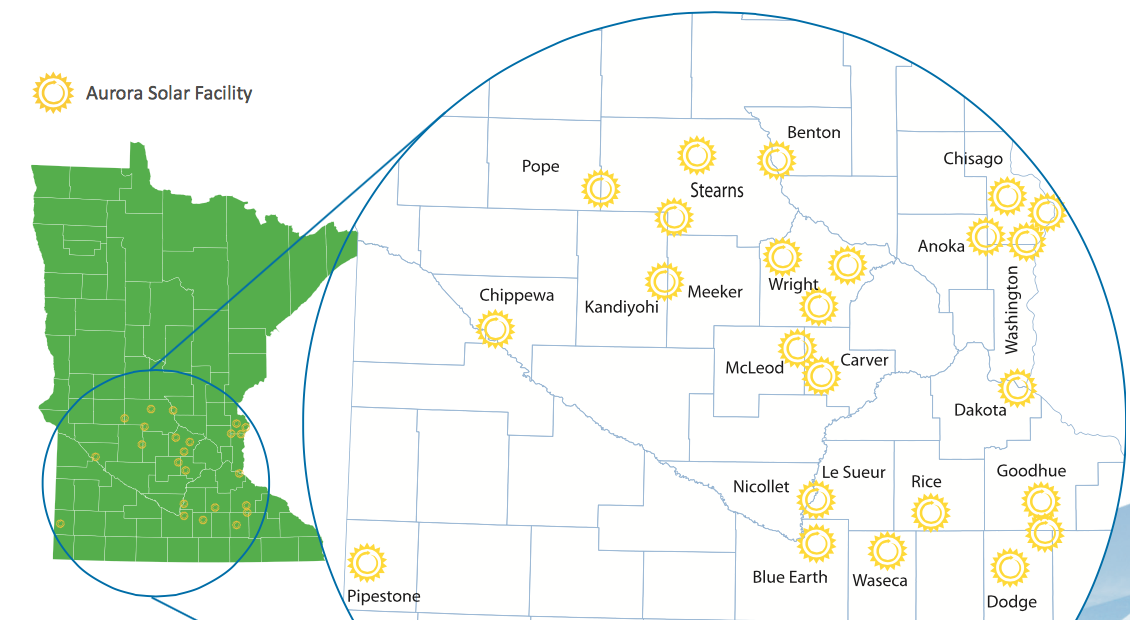Minnesota is about to get a lot more clean energy from a new ground breaking solar project. The Aurora Solar Project, developed by Geronimo Energy, is a 100 megawatt (MW) project, which will be located at 21 different sites across the state. For those who don’t know, 100 MW is a lot of energy. The solar generated electricity produced by this project will be enough energy to power 20,000 homes and will grow the state’s total solar energy output by eight times current production. Not only is the size of this project impressive, the project is also affordable. In a highly competitive bidding process and without subsidies, the Aurora Solar Project beat out all natural gas proposals on cost. This is a big deal for clean solar energy, which has often been criticized for being too costly when compared to fossil fuels. When you combine the affordability of a project like this one with the fact that no pollution will come from it, moving off dirty coal seems like a no brainer.
One of the biggest benefits of the project is that all of the sites for this clean generation will be located in greater Minnesota. Of the 21 Aurora Solar Project locations, one of the biggest will be located in Montevideo, Minnesota, CURE’s hometown. Geronimo Energy will build the 26-acre solar farm outside of Montevideo, near the local Walmart. This solar site will be the first major solar development in the Montevideo area and will give community members an understanding of the real benefits of solar energy. The Montevideo site will be connected to Xcel Energy’s Fiesta City substation and provide local electricity for the community. And not only will this project provide clean reliable energy to the local grid, Chippewa County and Sparta Township will receive ongoing tax revenues from the project.
 What is perhaps most remarkable about the Aurora Solar Project, however, is that it is a bright example of what we can look forward to as our economy shifts over to renewable power. Geronimo understands that good business isn’t simply about maximizing profit at the expense of everything else; good business is about considering the diversity of options and cleverly designing for the future we would like to see.
What is perhaps most remarkable about the Aurora Solar Project, however, is that it is a bright example of what we can look forward to as our economy shifts over to renewable power. Geronimo understands that good business isn’t simply about maximizing profit at the expense of everything else; good business is about considering the diversity of options and cleverly designing for the future we would like to see.
One of the hallmarks of Geronimo’s approach is active community engagement throughout the development of their projects. For Aurora, they met regularly with communities even when they were not required to do so through the permitting process. But as a result, 21 of the proposed 24 project sites are going through without controversy, and Montevideo is no exception. Reflecting on the experience, Montevideo city manager Steve Jones said, “We have worked with Aurora for close to two years and appreciate the fine job they have done.”
Moreover, being unable to build at three sites has not thrown the project off track because Geronimo planned for opposition. The original proposal included more building sites than were necessary so that the company would be able to easily let go when some communities resisted the development. The result? Locations that are hosting the sites are happy to do so, and Geronimo has built a favorable reputation. Geronimo understands that a smart business model includes happy customers, not projects just for the sake of ground-breaking.
 Geronimo has also listened to the needs of the broader conservation community as they’ve designed the Aurora project. One of the notable examples of this is that they are planning to plant a pollinator-friendly mix of plants under the solar panels, providing habitat for the insects that have captured the attention of people all over the world at the same time that they are generating localized energy.
Geronimo has also listened to the needs of the broader conservation community as they’ve designed the Aurora project. One of the notable examples of this is that they are planning to plant a pollinator-friendly mix of plants under the solar panels, providing habitat for the insects that have captured the attention of people all over the world at the same time that they are generating localized energy.

The Pollinator Pledge, championed by Fresh Energy, is just the beginning of what we have to look forward to as we transition away from an energy system dominated by giants unresponsive to the needs of their local and global communities, and towards companies that are smartly and openly designing a systems that will lead to a cleaner, healthier, and brighter future. This is something we can all fight for and look forward to.
Blog post by Kristian Nyberg, Energy Program Coordinator, and Ariel Herrod, Water Program Coordinator.
